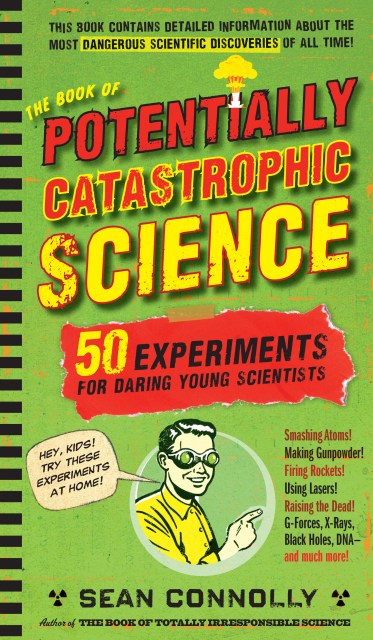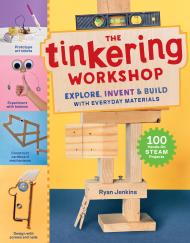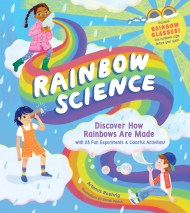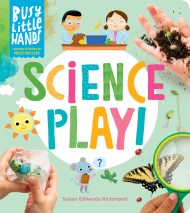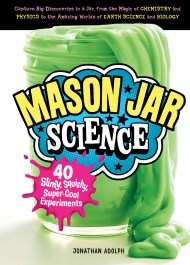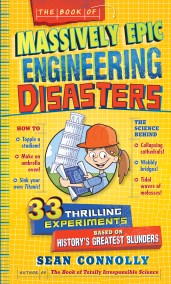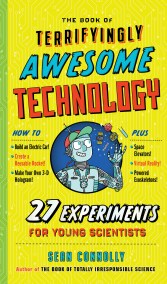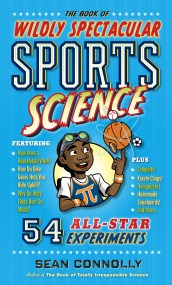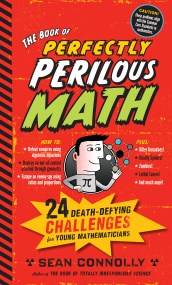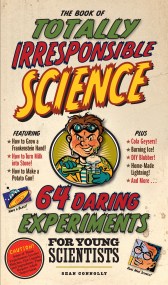The Book of Potentially Catastrophic Science
50 Experiments for Daring Young Scientists
Contributors
Also available from:
- On Sale
- Mar 7, 2017
- Page Count
- 306 pages
- Publisher
- Workman Publishing Company
- ISBN-13
- 9780761189862
It’s never been more important to engage a child’s scientific curiosity, and Sean Connolly knows just how to do it—with lively, hands-on, seemingly “dangerous” experiments that pop, ooze, crash, and teach! Now, the author of The Book of Totally Irresponsible Science, takes it one step further: He leads kids through the history of science, and then creates amazing yet simple experiments that demonstrate key scientific principles.
Tame fire just like a Neanderthal with the Fahrenheit 451 experiment. Round up all your friends and track the spread of “disease” using body glitter with an experiment inspired by Edward Jenner, the vaccination pioneer who’s credited with saving more lives than any other person in history. Rediscover the wheel and axle with the ancient Sumerians, and perform an astounding experiment demonstrating the theory of angular momentum. Build a simple telescope—just like Galileo’s—and find the four moons he discovered orbiting Jupiter (an act that helped land him in prison). Take a less potentially catastrophic approach to electricity than Ben Franklin did with the Lightning Mouth experiment. Re-create the Hadron Collider in a microwave with marshmallows, calculator, and a ruler—it won’t jeopardize Earth with a simulated Big Bang, but will demonstrate the speed of light. And it’s tasty!
By letting kids stand on the shoulders of Aristotle, Newton, Einstein, the Wright brothers, Marie Curie, Darwin, Watson and Crick, and more, The Book of Potentially Catastrophic Science is an uncommonly engaging guide to science, and the great stories of the men and women behind the science.
Tame fire just like a Neanderthal with the Fahrenheit 451 experiment. Round up all your friends and track the spread of “disease” using body glitter with an experiment inspired by Edward Jenner, the vaccination pioneer who’s credited with saving more lives than any other person in history. Rediscover the wheel and axle with the ancient Sumerians, and perform an astounding experiment demonstrating the theory of angular momentum. Build a simple telescope—just like Galileo’s—and find the four moons he discovered orbiting Jupiter (an act that helped land him in prison). Take a less potentially catastrophic approach to electricity than Ben Franklin did with the Lightning Mouth experiment. Re-create the Hadron Collider in a microwave with marshmallows, calculator, and a ruler—it won’t jeopardize Earth with a simulated Big Bang, but will demonstrate the speed of light. And it’s tasty!
By letting kids stand on the shoulders of Aristotle, Newton, Einstein, the Wright brothers, Marie Curie, Darwin, Watson and Crick, and more, The Book of Potentially Catastrophic Science is an uncommonly engaging guide to science, and the great stories of the men and women behind the science.
Series:
-
"A lot of mankind's greatest advances have been just a smidge away from disaster. The Wright Brothers' flying machine, Ben Franklin's fiddling with lightning, Enrico Fermi's chain reaction. In the book, Connolly explains these discoveries and applies the concepts to scaled-back (and kid-safe) experiments that use common household items. Each experiment gets rated on a "catastrophe meter," so adults can judge the danger quotient and how much help they need to offer."
"Budding scientists can learn about principles such as air resistance, condensation and the electromagnetic spectrum. But they learn because Connolly has them making a parachute that safely delivers eggs, crushing a can through sudden condensation or projecting an image of the bones in their hand on a wall. It's all done in an engaging, fun manner."
Formats and Prices
Price
$9.99Price
$12.99 CADFormat
Format:
- ebook $9.99 $12.99 CAD
- Hardcover $14.95 $19.95 CAD
Newsletter Signup
By clicking ‘Sign Up,’ I acknowledge that I have read and agree to Hachette Book Group’s Privacy Policy and Terms of Use
